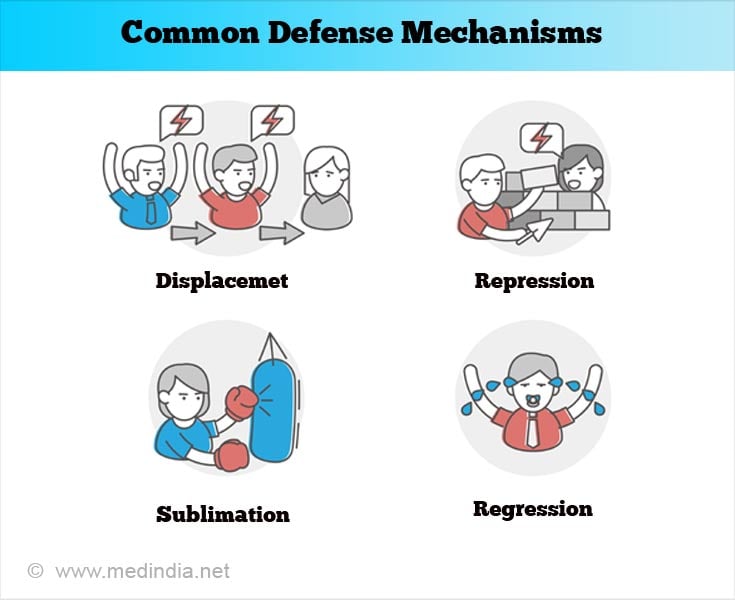- About Defense Mechanisms - (https://www.medicalnewstoday.com/articles/defense-mechanisms)
- Primitive Defense Mechanisms - (https://psychcentral.com/lib/15-common-defense-mechanisms#primitive-defense-mechanisms)
- 20 Common Defense Mechanisms Used for Anxiety - (https://www.verywellmind.com/defense-mechanisms-2795960)
- What is a Defense Mechanism? - (https://corporatefinanceinstitute.com/resources/knowledge/deals/defense-mechanism/)
- Defence Mechanisms List - (https://www.psychologistworld.com/freud/defence-mechanisms-list)
Overview
In the field of Psychology, defense mechanisms are a way in which a person does behave or think in certain ways to better protect or “defend” their inner selves, such as their personality and self-image.
Defense mechanism is usually used when a person does not know how to work around ones thoughts, feelings and behaviors healthily.
Most defense mechanisms are fairly unconscious and many are not aware that they are using it in the present moment. Some types of psychotherapy can help a person become well-aware of what defense mechanisms they are using and how effective they actually can be. Let us now look at the different types of defense mechanisms.
Types of Defense Mechanisms
Defense mechanisms are of various types, however, let us look at the most common mechanisms.
1. Denial
Denial is the complete refusal to accept reality, acting as if a painful event, thought or feeling does not even exist. It is totally considered to be one of the most primitive of the defense mechanisms because it is a full-blown characteristic of early childhood development. Many people do use denial in their everyday lives in order to avoid dealing with painful feelings.
2. Dissociation
Dissociation implies that a person loses track of time and/or a person, and instead goes on to find another representation of their own self, propelling them to continue to be in the lived moment. A person who does dissociate often loses total track of time or themselves and in turn, their usual thought processes and memories. People who do have a history of any kind of childhood abuse often do suffer from some form of dissociation for sure.
In extreme cases, dissociation can even lead to a person believing that they have multiple selves ( i.e., by way of ‘multiple personality disorder’ now known as dissociative identity disorder). It is vital that people who use dissociation often have a disconnected view of themselves in their innate world. Please note that time and their own self-image may not flow continuously, as it does happen for most people. In this particular manner, a person who dissociates can totally “disconnect” from the real world for a time, and then live in a different world that is not cluttered with any thoughts, feelings or even memories that are unbearable and intolerable.
3. Reaction Formation
Reaction formation is the way of converting the unwanted or even dangerous thoughts, feelings or impulses into their absolute opposites. For instance, a woman who is immensely angry with her boss and would actually like to quit her job then may instead be overly kind and generous toward her boss and then express an innate desire to keep working there forever. She is highly incapable of expressing the negative emotions of anger and unhappiness with her existing job, and instead becomes overly kind by publicly demonstrating her lack of anger and even unhappiness.
4. Repression
Repression is the unconscious blocking/stoppage of all the unacceptable thoughts, feelings and impulses. The key to repression is that people do it quite unconsciously, so they often have very little control over it as well. Repressed memories are often the memories that are unconsciously blocked from complete access or even view. Because memory is very malleable and more so ever-changing, it is similar to playing back a DVD of your complete life. The DVD has been totally filtered and even altered by your life experiences, even by what you have read or even viewed.
5. Intellectualization
When a person does intellectualize, they do shut down all their emotions and even approach a situation solely from a total rational standpoint, especially when the complete expression of emotions would be totally appropriate.
Intellectualization lays an overemphasis on one’s thinking when been confronted with an unacceptable and impermissible impulse, situation, or even behavior without going further to employ any emotions whatsoever to help mediate and place the same coherent plus rational thoughts into an emotional plus human context. Instead of addressing painful emotions, a person may employ intellectualization to distance themselves from the impulse, an event or a behavior. For instance, a person who has just been given a terminal medical diagnosis, instead of expressing their total sadness and grief, may focus on the details of all the possible fruitless medical procedures.

6. Rationalization
Rationalization emphasis on being seen in a different light by way of an alternate explanation for one’s perceptions or behaviors in the very face of changing reality. For example, a woman who starts dating a man she really likes and then begins to think why he was dumped by so many girls before, makes her re-imagine and re-interpret the situation in her mind with a thought like, “I did suspect he was a loser all along.”
7. Sublimation
Sublimation is channeling of the unacceptable and intolerable impulses, thoughts and emotions into more acceptable ones. Say when a person does have sexual impulses they would not act upon the same, they may focus on, say
Sublimation can be done with humor or fantasy too. Humor used as a defense mechanism channelizes the unacceptable impulses or thoughts into, say a light-hearted story or joke. Humor does reduce the intensity of a situation and then places a cushion of laughter between the person and the varied impulses.
Fantasy as a defense mechanism, is about channeling the unattainable desires into complete imagination. Imagining one’s ultimate career goals can be helpful when one experiences, say temporary setbacks in an academic or a professional achievement. Both (humour and fantasy) can help a person look at a situation in a different way or even focus on aspects of the situation that are not previously explored.
8. Assertiveness
You can be clear and totally assertive in your communication without being aggressive and blunt.
Assertiveness is the complete emphasis of a person’s needs or thoughts in a manner that is by being respectful, direct and yet firm. Communication styles in continuum do range from the passive to aggressive, with assertiveness placed in-between. Please note: people who are passive and communicate in a passive manner are good listeners but do not speak up for themselves or even their own needs in a relationship.
People who are aggressive, communicate in an aggressive manner are also good leaders, but often at the expense of listening with empathy to others and their ideas plus needs. People who are assertive do strike a balance where they speak for themselves, express their complete opinions or needs in a respectful plus firm manner, and then listen when they are being spoken to. Becoming more assertive is one of the most desired communication skills and even helpful defense mechanisms most people want to learn to imbibe.
Treatment Options
Developing defense mechanisms is a part of normal development and these mechanisms can also be positive ways of handling difficult situations. Please note: repeated use of defense mechanisms may hinder a person’s ability to deal with their own feelings and emotions.

Some people become so stuck in patterns of thinking that they rely only on defense mechanisms. This can negatively affect the person, also their relationships with others.
Please note with the right treatment; people do find positive ways of dealing with all the uncomfortable feelings and emotions. Over time, the use of all the unhelpful defense mechanisms must diminish and reduce.
The right treatment for a person who routinely uses defense mechanism depends on the types of mechanisms that they use and on whether they have any underlying mental health conditions.
Some options include:
Talk therapy: This can help a person completely explore the thoughts and feelings that may be behind a particular defense mechanism. Therapy may even involve one-to-one sessions or group sessions.
Stress management: Some people benefit from lifestyle changes that help them manage their stress levels. Stress management can help reduce the need for defense mechanisms too. Some helpful techniques include:
- Regular exercise or physical activity
- Yoga
- Meditation
- Relaxation therapy

Medication: A person may also require medication for an underlying mental health condition. Depending on the condition, the treatments may include:
- Antidepressants
- Anti-anxiety medications
- Antipsychotics
Conclusion
Defense mechanisms are a natural part of human psychology. They help the mind to cope with uncomfortable and traumatic situations or even emotions. However, some people routinely use defense mechanisms as a way of avoiding their feelings and emotions or excusing their behavior. This can have a negative impact on a person’s mental health and even relationships.
If a person is continually relying on all the unhelpful patterns of thinking, they may wish to seek support from a qualified therapist. With the right treatment, people can reduce their use of defense mechanisms and then learn to address their feelings and emotions in a more positive and even constructive way.
 MEDINDIA
MEDINDIA

 Email
Email




